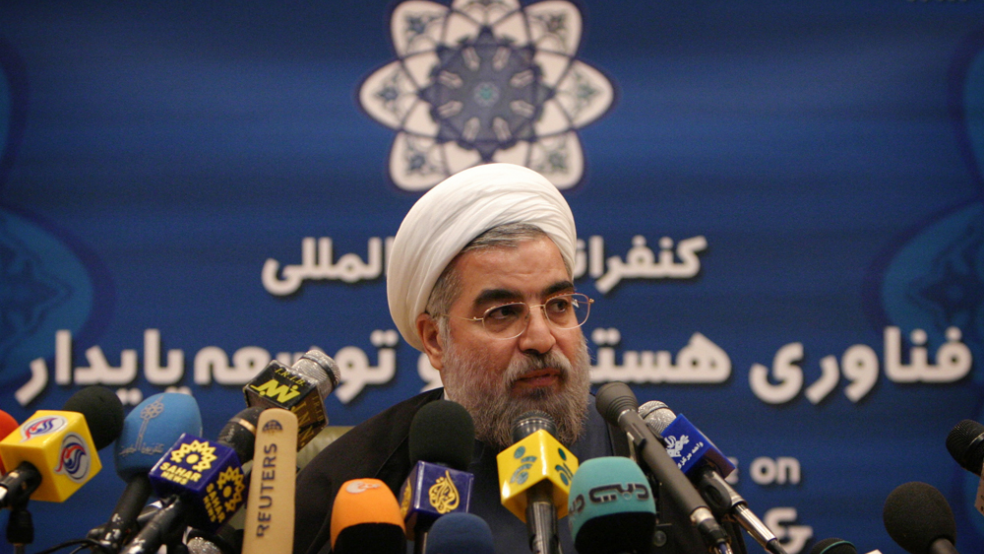We begin a big, consequential week in world politics. This year’s UN General Assembly will put President Obama, Israeli Prime Minister Benjamin Netanyahu, and Iran’s new president, Hassan Rouhani, in the same room,  addressing the same heads of state, walking the same carpets in the lounges. Given the tensions surrounding Iran’s nuclear program and its emergence as a regional power, anything short of combustion is possible.
addressing the same heads of state, walking the same carpets in the lounges. Given the tensions surrounding Iran’s nuclear program and its emergence as a regional power, anything short of combustion is possible.
Even if nothing at all gets said among these three leaders—and that could well be—the choreography will be a diplomatic ballet worthy of Balanchine, exquisite to watch and laden with significance. We will end the week tentatively on the trail toward reconciliation with Iran or further on the way to danger. In my view, the road taken is up to Obama alone.
Obama has a chance to start turning 34 years of messy non-relations with Iran into a policy success as big as Carter’s Camp David accords. If you think of the potential here for advancing the Middle East beyond incessant crisis, you can recall Nixon’s opening to China.
Can Obama pull something off with Iran’s new reformist leader? What exactly is on offer? Does Rouhani truly want to deal? Does Obama? These are all legitimate questions, and the first clues are coming.
On the Sunday talk shows, the daydream du jour was whether Obama will in some minimal fashion connect with Rouhani, who has been blowing bubbles Washington’s way since he was elected in June. Gwen Ifill on ABC’s “This Week,” hopes for a handshake. “Even a still photograph would be course changing,” the always-astute Ifill remarked.
It would. Ifill sees the prospects. But it is too soon and too risky for Obama to make overt gestures toward the Islamic republic, one of the remaining points on the old “axis of evil.” A discreet nod in Rouhani’s direction would be surprise enough, and Obama would have to pull that off when Netanyahu was not looking.
RELATED: IRAN OPENS THE DOOR TO NUCLEAR PROGRAM—FOR A PRICE
Whatever the language at the UN, whatever the gestures, behind them is a machine with four moving parts. Each one is complex, to say nothing of fitting them together.
First we have to decipher Tehran’s intentions, which requires time. What we have now are good signals.
READING THE IRANIAN TEA LEAVES
Rouhani is explicit in articulating his desire to pull Iran out of isolation and the mess his predecessor, Mahmoud Ahmadinejad, made of Tehran’s foreign relations, economy, domestic politics, nuclear program, and all else one can think of. The core thought is legitimization—or, if it is not too much, “legitimate legitimization,” meaning reformist policies we can all see.
Rouhani is the Iran that wants to join the community of nations. Among much else, this means a nuclear program in conformity with international law and co-existence with Israel. These are the big signals; this is the language Rouhani speaks.
Sanctions are crumbling the Iranian economy into rubble. Inflation is 32 percent, oil production is off by 40 percent, and unemployment is 20 percent. Rouhani lives with this. Iranians can hardly do business in Iraq, a big market next door in industries such as refining technology, because the rial trades in the black market at a fraction of the official rate.
Politics and national aspiration also figure. There is ebb and flow in the Iranian political scene, and the reformists constitute a formidable wave. The clerics rule--a problem for Iranian secularists and nobody else. The idea that one cannot negotiate with any ayatollah is primitive prejudice at its plainest. As for Supreme Leader Ali Khamenei, I think of him as either a well-greased weather vane or a political surfer the match of any kid in Hawaii.
At the moment, Khamenei says he stands behind the new president. But as Rouhani warns, there may not be much time. When the Americans and Israelis talk about short time, they mean the pace of Iran’s nuclear advances, whatever that may be. Rouhani means, roughly, “Help me get this deal done before the Ahmadinejad sort sabotage what I think is possible.”
If Rouhani is for real, a deal depends on Obama’s judgments now. As a president on the second half of his eight-year run, he has to be watching the legacy ratings. He is mindful of the skeptics, but he does not appear to be one. He, too, wants a deal. But he has a hard sell on his hands. I worry more about what goes on in Washington than I do about Tehran, and there are two reasons for this.
For one thing, too many policymakers assume a deal means Iran has no nuclear program. This is a nonstarter. Iran wants a program; the question is whether it is bomb-capable or not.
RELATED: SANCTIONS WILL TURN IRAN INTO ANOTHER CUBA
Obama’s other problem is just as formidable. Negotiations with Iran of any kind are a dicey political risk; talks about a nuclear program—well, it may prove easier to deal with ayatollahs than Capitol Hill. If Obama goes ahead, he implicitly breaks a mold—the old mold of unilateralism. It is difficult to tell if he has the commitment and the political capital.
Obama will need both if he is to match domestic resistance to a renovated policy toward Iran. Here is Newt Gingrich describing Rouhani to Gwen Ifill on Sunday: “This is a guy who’s going to charm us, he’s going to talk with us, he’s going to have tea with us, he’s going to do photo ops with us. And he’s going to build a nuclear weapon.”
This is destructive thinking. Here's why:
Problem 1. Objecting to positive signals from a long-estranged nation is specious argument.
Problem 2. We have no proof of Tehran’s intent to weaponize, never have had any, and we have a leader saying plainly it is not in the plan.
Problem 3. Just assuming Tehran does want to weaponize, is talking not the more urgent? Or does Washington talk only to those who do not want nuclear weapons—the Swiss and the Costa Ricans, maybe?
Problem 4. Here is Gingrich again: “A meeting with the President of the United States is an enormous advantage to anybody who’s been isolated. So what do we get for the meeting? What are they going to give us?” Casting diplomacy with the U.S. as some kind of benediction is half arrogance, half prudery, and transparently intended to scuttle any effort Obama may make. Nobody is talking about a summit now, in any case. That is a straw man.
THE ISRAEL FACTOR
Which brings us, finally, to Netanyahu’s resistance. Last week the Israeli leader wrote off Rouhani’s demarche as “media spin,” as if he or anybody else can yet judge. He then restated his four stipulations for a settlement with Tehran: All enrichment stops, all enriched uranium is exported, an underground enrichment facility near Qom is closed, and there is no plutonium development. These demands test the bounds of sovereignty, which (as Netanyahu knows) is a hot button among Iranians.
RELATED: HOW THE U.S. CAN WIN THE IRANIAN NUCLEAR SHOWDOWN
Hot buttons and hot seats. Obama will now sit in the latter. To choose against Rouhani’s challenge will put him on the wrong side of history and go down in the books as unforgivable incompetence. Rouhani will prove the one with guts, Obama the weakling. But to pursue an opening with Tehran will risk a split with Israel—Netanyahu’s Israel, anyway—that could turn out to be as historically fateful as any restoration of relations with the Iranians.
Der Spiegel just reported that Rouhani may be willing to shut the nuclear plant near Qom (called Fordo) in a deal to drop sanctions. It is a striking concession, if true. (The German weekly quoted intelligence sources, so who knows?) Safe to consider it a preview.
We all know the expression, “Is this a great country or what?” If the administration punts the opportunity that will open at the UN this week, maybe we have to start considering “what.”






